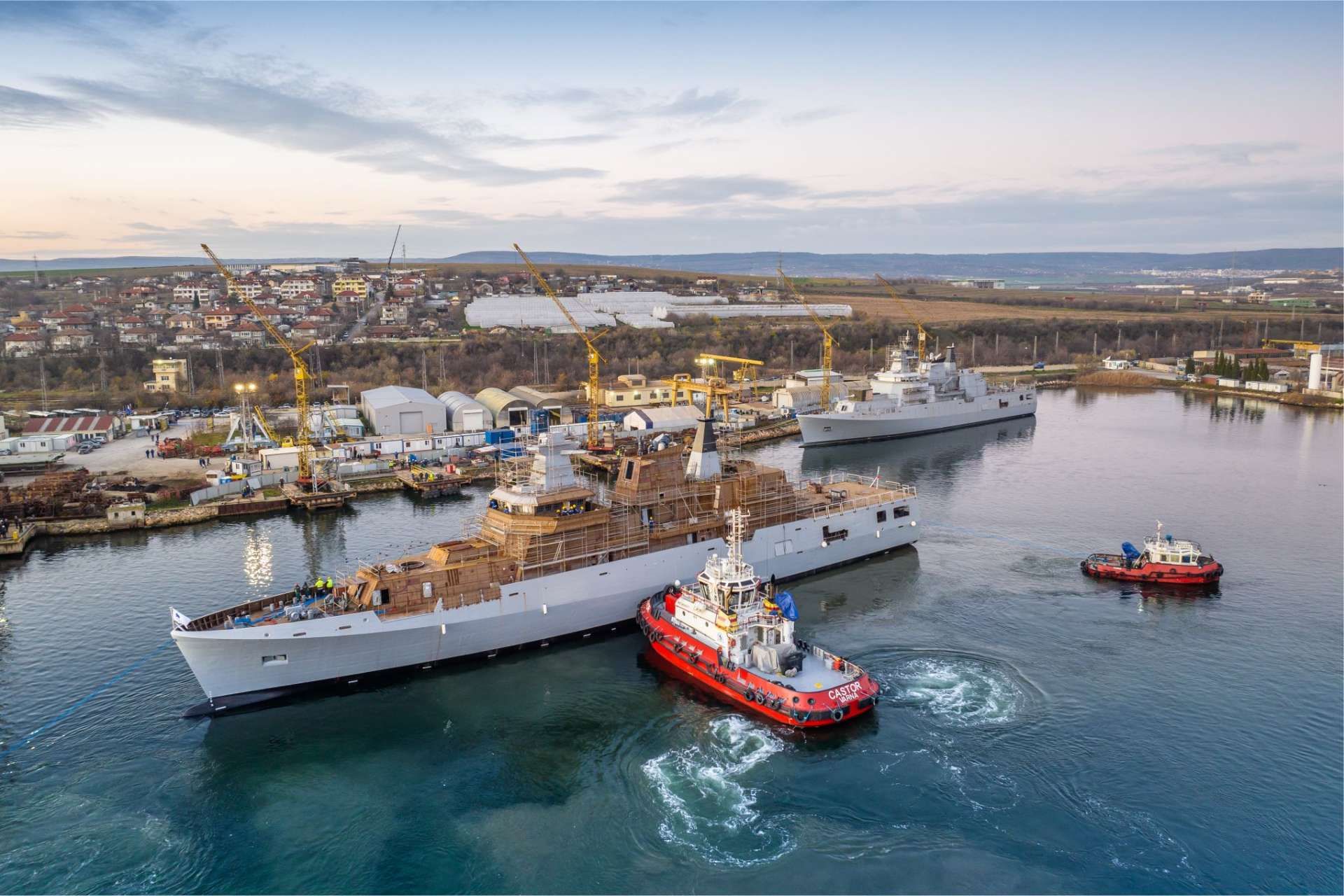Breaking News
Bulgaria's Naval Modernization: Second Patrol Vessel Successfully Launched.
According to information published by MTG Dolphin on December 13, 2024, the second Multipurpose Modular Patrol Vessel (MMPV) for the Bulgarian Navy was successfully launched at the MTG Dolphin Shipyard in Varna.
Follow Army Recognition on Google News at this link

Launching ceremony of the second Bulgarian Navy's Multipurpose modular patrol vessel or MMPV. (Picture source: MTG Dolphin Shipyard)
The MMPVs, designed for versatility and multi-role operations, are being constructed at MTG Dolphin Shipyard under a contract with the Bulgarian Ministry of Defense. The project is carried out in cooperation with NVL Group (formerly known as Lürssen Defence), a renowned German shipbuilder specializing in naval vessels.
The Multipurpose Modular Patrol Vessels are intended to perform a variety of missions, including maritime surveillance, search and rescue (SAR), anti-surface warfare (ASuW), and environmental monitoring.
The first MMPV was launched earlier this year, marking the beginning of the new generation of patrol vessels for Bulgaria. With the successful launch of the second vessel, the Bulgarian Navy is on track to further enhance its naval capabilities and operational readiness in the Black Sea region, a strategically important area for both national and NATO interests.
The MMPVs are expected to feature a displacement of approximately 2,300 tons, a length of around 90 meters, and a speed exceeding 21 knots. The vessels will accommodate 50-60 personnel and be equipped with modular weapons systems for anti-surface and anti-air defense, as well as advanced radar and surveillance systems for maritime situational awareness. They will also support mission-specific equipment, including unmanned systems and auxiliary boats for interception, rescue, or inspection operations.
Black Sea
The Black Sea remains a vital and contested maritime domain, with the navies of Russia, Ukraine, Turkey, Romania, Bulgaria, and Georgia all navigating evolving challenges and roles in the region.
Russia's Black Sea Fleet, once dominant, has faced severe disruptions. Ukrainian attacks, particularly with drones and long-range missiles, have significantly reduced Russia’s operational freedom. The loss of the Moskva cruiser and repeated strikes on Sevastopol have forced Russia to reposition much of its fleet to Novorossiysk and further into the Sea of Azov. While it retains submarines and missile-capable corvettes, Russia’s ability to project power in the Black Sea has been hampered, forcing it into a more defensive posture.
The Ukrainian Navy, though diminished in conventional strength, has revolutionized naval warfare in the Black Sea. With innovative use of unmanned surface vessels and domestically produced Neptune missiles, Ukraine has inflicted disproportionate damage. This asymmetric strategy has not only targeted major Russian vessels but has also disrupted supply lines to Crimea, diminishing Russia's naval control.
Turkey, as the most significant naval power in the Black Sea, carefully manages its position. Its navy, which operates advanced frigates, corvettes, and submarines, focuses on safeguarding Turkish interests while balancing its geopolitical relationships. Turkey’s strict enforcement of the Montreux Convention limits external naval intervention in the Black Sea, ensuring it remains a regional actor with considerable influence.
Romania’s naval forces are modest but active. While relying on aging Type 22 frigates and smaller patrol vessels, Romania has increasingly focused on modernization programs to enhance its capabilities. This includes upgrading its fleet for better coastal defense and mine-clearance operations, vital for maintaining the safety of Black Sea shipping lanes.
Georgia does not maintain a formal navy. Its Coast Guard remains responsible for maritime security, focusing on territorial water patrols and countering smuggling. Heavily reliant on external support, Georgia continues to upgrade its patrol capabilities through assistance programs.


























